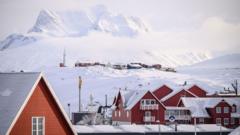A high-ranking delegation from the United States, led by Vice-President JD Vance, is set to visit Greenland amid rising tensions over perceived US intentions towards the island. The visit, originally supposed to be a cultural tour, has transformed into a politically charged event, prompting strong reactions from Greenland’s government and citizens.
Greenland Braces for High-Stakes US Visit Amid Tensions

Greenland Braces for High-Stakes US Visit Amid Tensions
US Vice-President JD Vance's planned visit raises concerns in Greenland over sovereign issues and US ambitions.
The delegation includes notable officials such as National Security Advisor Michael Waltz and Secretary of Energy Chris Wright, with the trip drawing increasing scrutiny due to its political ramifications. Initially, Usha Vance, the vice-president’s wife, planned to attend cultural activities like a dog-sledding event in Nuuk with her son; however, the invitation raised alarms considering President Trump's past interest in acquiring Greenland due to its strategic resources.
Greenland’s Acting Prime Minister, Mute B Egede, labeled the visit a “provocation” and a show of power, emphasizing that the Greenlandic government did not invite the delegation. Ordinary citizens echoed these feelings, with some planning silent protests against the visit. As part of backlash, the mayor of Sisimiut declined to meet Usha Vance, leading analysts to note that the trip could result in negative public relations for the US administration.
In a rapid change of plans, the cultural itinerary was replaced by a visit to the US military base, Pituffik Space Base. Although this development was framed positively by Danish officials, it nonetheless signifies a continued focus of the Trump administration on Greenland, reinforcing the security narrative surrounding the island.
Experts suggest geopolitical interests, including vital Arctic waterways and national security concerns, underpin the current US administration's attention towards Greenland, mirroring past superpower conflicts. This visit underscores an ongoing diplomatic challenge, leaving Greenland's political landscape increasingly complex and the dynamics of US-Danish relations in a delicate balance. The events may signal just the beginning of prolonged discussions and negotiations surrounding Greenland’s future in the geopolitical arena.
Greenland’s Acting Prime Minister, Mute B Egede, labeled the visit a “provocation” and a show of power, emphasizing that the Greenlandic government did not invite the delegation. Ordinary citizens echoed these feelings, with some planning silent protests against the visit. As part of backlash, the mayor of Sisimiut declined to meet Usha Vance, leading analysts to note that the trip could result in negative public relations for the US administration.
In a rapid change of plans, the cultural itinerary was replaced by a visit to the US military base, Pituffik Space Base. Although this development was framed positively by Danish officials, it nonetheless signifies a continued focus of the Trump administration on Greenland, reinforcing the security narrative surrounding the island.
Experts suggest geopolitical interests, including vital Arctic waterways and national security concerns, underpin the current US administration's attention towards Greenland, mirroring past superpower conflicts. This visit underscores an ongoing diplomatic challenge, leaving Greenland's political landscape increasingly complex and the dynamics of US-Danish relations in a delicate balance. The events may signal just the beginning of prolonged discussions and negotiations surrounding Greenland’s future in the geopolitical arena.





















